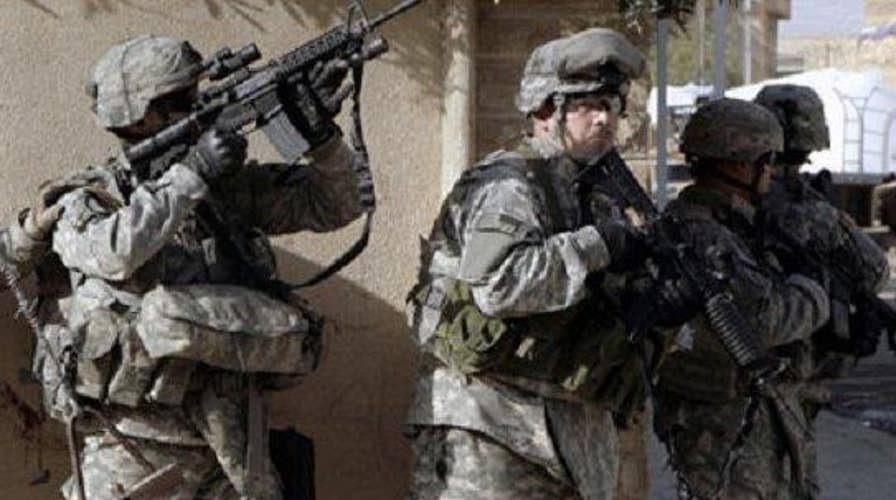U.S. troops fighting in Syria, Iraq and Yemen
'The O'Reilly Factor' analyzes the Trump administration's foreign policy and the Middle East
U.S. special operations forces are assisting Yemeni and United Arab Emirates forces in a major operation in Yemen against Al Qaeda in the Arabian Peninsula (AQAP), long seen as the biggest threat to the United States through its development of non-metallic bombs designed to slip through security and bring down commercial airliners.
UAE Ambassador to the United States Yousef Al Otaiba announced the operation in a statement released by the UAE Embassy in Washington, D.C. “Earlier today, Yemeni government armed forces launched a major operation against Al Qaeda in the Arabian Peninsula (AQAP) militants in the Shabwah Governorate of Yemen. The operation is being closely supported by a combined UAE and US enabling force.”
The statement continued, “The UAE is participating in this operation as part of a broader Arab coalition. Today’s action continues the coalition’s sustained counterterrorism mission in Yemen against AQAP, in order to disrupt the terrorist organization’s network and degrade its ability to conduct future attacks.”
A senior defense official tells Fox News the U.S. special operations forces are acting in a supporting role in what the official described as a multi-day “clearing operation” in Yemen against AQAP.
“This is not a one-day thing,” the official said describing the mission.
Meantime, Yemen's ambassador to the U.S., Ahmed Awad bin Mubarak, told Fox News Yemen welcomed “political and logistical support” from the U.S. -- but not ground troops.
YEMEN AMBASSADOR TO U.S.: NO AMERICAN GROUND TROOPS NEEDED
U.S. special operations forces are assisting Yemeni and UAE forces in an advisory capacity but could engage in direct combat if needed. However, UAE is primarily in the lead, according to the official.
U.S. Navy SEALs have participated in these types of operations since President Trump took office.
The U.S. military typically supports these types of operations by providing transport aircraft, refueling planes and -- if needed -- a ready medical team to evacuate any wounded. A “quick reaction force” held in reserve off shore would be on alert to go in as necessary, but it’s not immediately clear how many U.S. assets are being used. The official declined to comment on this aspect of the operation.
Defense Secretary Jim Mattis will travel Friday to Dam Neck, Virginia, home to SEAL Team Six, and will receive an update on the operation, according to officials.
There have been more than 80 U.S. airstrikes in Yemen since President Trump took office, double the average over the past five years.
Days after Trump took office, Navy SEAL Ryan Owens was killed in a raid in Yemen against AQAP. A rescue aircraft, MV-22 Osprey, was dispatched from a Navy warship offshore landing near the battle. A crash-landing of the aircraft injured three crewmembers attempting to rescue three SEALs wounded in the firefight.
A total of 14 fighters from Al Qaeda in the Arabian Peninsula were killed in the assault, and U.S. service members captured "information that will likely provide insight into the planning of future terror plots," the military said at the time.
In addition to the rescue operation, Marine Corps Harrier jets and helicopter gunships from USS Makin Island, a Navy amphibious assault ship, bombed the Al Qaeda stronghold.
The U.S.-backed Yemen operation comes on heels of the Qatari ambassador to the United States' visit to U.S. Central Command based in Tampa, Florida, responsible for all U.S. military operations in the Middle East and Afghanistan. It’s possible Qatar’s ambassador, Sheikh Meshal bin Hamad Al-Thani, wanted attention to this current operation to counter or compete with the message of solidarity the visit showed.
Yemen was the home of Anwar al-Awlaki, the American Islamic terror cleric linked to a chain of attacks targeting the United States. A drone strike killed him in 2011, according to the Pentagon.
In 2009, Umar Farouk Abdulmutallab, a Nigerian recruit to Al Qaeda’s Yemen branch, tried and failed to blow up a Detroit-bound airliner on Christmas Day with explosives in his underwear. Investigators say he trained under al-Awlaki.
The previous month, Nidal Malik Hasan, a U.S. Army Medical Corps psychiatrist, killed 13 people at Fort Hood in Texas. Hasan launched the attack three weeks before he was due to deploy to Afghanistan. He had previously sent emails to al-Awlaki, investigators said.
Saudi Arabia along with other Gulf nations, including UAE, have severed diplomatic ties and imposed a boycott against Qatar since early June, claiming the tiny Gulf nation supports and terrorist groups including the Taliban and Hamas. In an interview with the Tampa Bay Times, Al-Thani said he wanted to convey to the commanding general of U.S. Central Command, Army Gen. Joseph Votel, “the commitment between Qatar and the U.S. It is not only political and economic, but most importantly military. Qatar is a long-standing ally of the U.S. in difficult times and good times.”
In February 2015, the State Department ordered an evacuation of the U.S. Embassy in Yemen. U.S. Marine guards were forced to leave behind some their weapons and vehicles in order to evacuate on a civilian chartered airline from the capital city of Sanaa.
Iran-backed Houthi forces swept into the capital, joining forces loyal to the former president Ali Abdullah Saleh and have fought a bitter civil war against the government of Abdrabbuh Mansur Hadi, based in Aden. A Saudi-led coalition which has received support from the United States has been battling the Houthis since 2015.
Fox News' James Rosen, Nick Kalman and Hollie McKay contributed to this report.








































